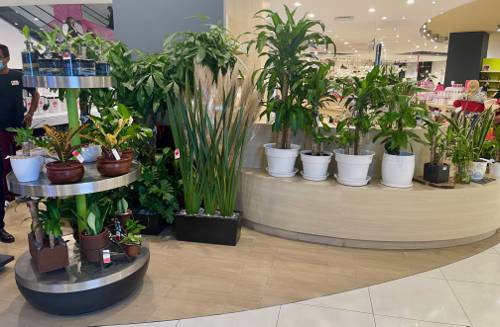
FAQ About Sustainable Indoor Plant Care Practices

What are some basic sustainable practices for indoor plant care?
Basic sustainable indoor plant care practices include using organic soil and fertilizers, collecting rainwater for watering, and reducing single-use plastic by opting for biodegradable or recycled plant pots. Additionally, you can start composting kitchen scraps to create nutrient-rich compost for your plants.

How can I reduce waste while taking care of indoor plants?
Reducing waste can be achieved by reusing containers as pots, recycling old newspapers as plant covers during cold spells, and composting organic waste. Avoiding chemical fertilizers and opting for natural alternatives also reduces packaging waste and environmental impact.

What are eco-friendly alternatives to chemical fertilizers?
Eco-friendly alternatives to chemical fertilizers include compost, worm castings, and natural fertilizers like banana peels or eggshells. Furthermore, organic commercial fertilizers are available and usually made from plant or animal materials.

How can I save water when watering indoor plants?
Save water by using rainwater or greywater from home activities like washing vegetables. Self-watering systems or adding water-retentive materials to soil can also optimize water usage. Additionally, grouping plants with similar watering needs together can minimize excess water use.

What are some sustainable resources for indoor plant care?
Sustainable resources include organic potting mixes, controlled-release fertilizers made from natural elements, and pest control methods like neem oil. Using energy-efficient grow lights and recycled or upcycled plant containers also enhances sustainability.

How can I use kitchen waste for indoor plant care?
Kitchen scraps such as coffee grounds, eggshells, and fruit peels can enrich soil with nutrients. These items can be composted or directly worked into the soil around plants, providing natural fertilizer and minimizing the need for chemical products.

Why is composting beneficial for indoor plants?
Composting is beneficial because it creates nutrient-rich soil amendments that promote healthy plant growth. It also reduces food waste and decreases reliance on chemical fertilizers, leading to a lower environmental footprint.

Which indoor plants are best for sustainable care?
Some indoor plants that align well with sustainable care include spider plants, pothos, and snake plants, as they are hardy, require minimal resources, and help purify the air. Succulents and cacti are also low-maintenance and water-efficient choices.

What are minimal-impact gardening practices for indoor plants?
Minimal-impact practices involve selecting plants suited to local climate and light conditions to reduce resource use, using organic materials, and practicing companion planting where possible. This approach reduces the need for external inputs such as chemical fertilizers and excess water.

How can I make my own natural pest control for indoor plants?
You can make natural pest control products using ingredients like neem oil, garlic sprays, or a mix of water and mild soap. These solutions are effective against common pests like aphids and spider mites without harming the environment.

Why should I avoid using plastic pots for indoor plants?
Avoiding plastic pots is advisable because they contribute to plastic pollution and can take centuries to decompose. Instead, opt for pots made from sustainable materials like clay, ceramic, or recycled materials that have minimal environmental impact.

Can greywater be safely used for watering indoor plants?
Yes, greywater from sources like rinsing vegetables or hand-washing can be safely used if it doesn’t contain harsh chemicals. It’s a practical way to conserve water, but should not be used on edible plants to avoid potential contamination.

What types of soil are best for sustainable indoor plant care?
For sustainable indoor plant care, look for organic potting soils that are free from peat moss, as harvesting peat bogs harms ecosystems. Soils that include compost or coconut coir are sustainable and provide excellent growing conditions.

How can I ensure my indoor plant care is sustainable year-round?
Year-round sustainability can be achieved by adjusting care routines with the seasons. Optimize natural light usage, change watering schedules, and ensure soil health through composting and organic fertilizers to maintain plant health throughout the year.

Are there any certifications to look for in sustainable plant care products?
Look for certifications such as the Organic Materials Review Institute (OMRI) label, which indicates that products meet standards for organic gardening, or EcoCert and USDA Organic for sustainable farming and products.

How does using organic soil help with sustainability?
Organic soil improves sustainability by reducing the need for synthetic fertilizers and pesticides. It promotes a healthy ecosystem within the pot, enhances water retention, and supports the microorganisms that naturally aid plants.

What is the best eco-friendly lighting for indoor plants?
Energy-efficient LED grow lights are the best choice for eco-friendly indoor plant lighting. They consume less electricity and have a longer lifespan compared to traditional incandescent lights, minimizing environmental impact.

Can all indoor plants thrive with sustainable practices?
Not all, but most common indoor plants can thrive with sustainable practices. These methods emphasize natural growth processes, encourage ecosystem balance, and focus on using resources efficiently to support plant health.

How does companion planting work for indoor plants?
Companion planting involves growing certain plants together to naturally enhance growth, deter pests, or improve soil health. For indoor setups, pairing plants that share similar light and water needs or that repel pests can be beneficial.

Is it necessary to avoid peat-based products for sustainable indoor gardening?
Yes, avoiding peat-based products is important, as peat extraction significantly disturbs biodiversity and carbon storage in ecosystems. Opt for peat-free alternatives like coconut coir and other sustainably-sourced amendments for more eco-friendly indoor gardening.
